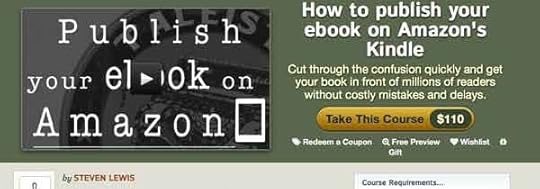Steven Lewis's Blog, page 20
June 5, 2013
The writers who don’t need books
This is a podcast: If you can’t see the player, listen to the podcast on Soundcloud . And, f you don’t want to listen to the podcast, you can read the script of the Sydney Writers’ Festival 2013 podcast.

Yup, I cracked out my beret for the Sydney Writers’ Festival
Joe Rospars helped get Barack Obama elected twice using his skills as a master storyteller. They might have written books about Rospars’ work but he, himself, hasn’t written one, yet he was still a headliner at the Sydney Writers’ Festival this year.
Similarly, Eli Horowitz has written a novel — sort of — but The Silent History is available only as an iPhone app. That’s, ahem, novel enough but it also has a feature that allows readers to add their own chapters.
I was lucky enough to speak to Rospars, Horowitz and Cheryl Strayed to report for the radio station Monocle 24.
This is that radio feature.
Just a handful of the berets I spotted on the last day of the festival…



Rate this post at: The writers who don’t need books
Read and comment on more great content on the Taleist self-publishing blog

May 27, 2013
What’s it like when Oprah picks your book?
(If you can’t see the audio player, you’ll find the interview with Cheryl on SoundCloud here.)
Cheryl Strayed is a New York Times bestselling writer. She’d already found an audience for her memoir Wild before Oprah called her mobile phone one day and told Strayed she’d chosen Wild as the first book in her new book club.
Wild is a profound book about Strayed’s decision to hike 1100 miles of the Pacific Crest Trail across west coast of the US. She was as physically unprepared for the solo trek as she was emotionally unprepared for the death of her mother, the life shattering event that led her to set off on what became a life-changing adventure.
It’s a book about grief, perseverance, redemption, second chances and reinvention. Strayed tells her tale fearlessly, although it involves examining her drug use, reckless sex life, poverty, and emotional distress.
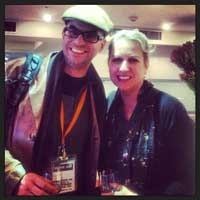
Red wines in hand, Cheryl Strayed and Steven Lewis
The fearlessness is evident also in Tiny Beautiful Things, the collected columns Strayed wrote as as the agony aunt Dear Sugar. Famously, among aspiring writers at least, she advised one correspondent with literary ambitions to just… write like a motherfucker.
I don’t feel often enough that reading a particular book was a privilege but it was a privilege to read both Wild and Tiny Beautiful Things; and it was a privilege to sit down with Strayed over a red wine at the Sydney Writers’ Festival to talk to her about both books.
Authors in any genre would benefit from Strayed’s commitment to the truth. I’d love to hear what you think of the interview and, if you’re willing to play Dear Sugar, yourself, what advice would you give an aspring author?
Rate this post at: What’s it like when Oprah picks your book?
Read and comment on more great content on the Taleist self-publishing blog

April 11, 2013
Quick guide to the Sydney Writers’ Festival 2013 for self-publishers

Self-publishers should be taking notes at these Sydney Writers’ Festival 2013 sessions
The Sydney Writers’ Festival 2013 program was launched last night, is now online, and will be in tomorrow’s Sydney Morning Herald. On one measure, it’s the third largest writing festival in the world, so it should be interesting to all authors. What follows are great sessions for self-publishing authors to attend.
Anna Maguire: Using and Understanding Crowdfunding
Are you interested in raising money for your writing project? Many writers are finding success through crowdfunding, with $150,000 pledged to writing projects through Australia’s leading platform Pozible last year alone. But crowdfunding isn’t as simple as launching your project and waiting for the money – around half will fail. Find out how to maximise your chance of success through choosing your platform, planning your project, your communication, creative rewards and how to share your story to engage support – and more.
Why self-publishers should attend: Crowdfunding is a viable way to fund writing projects and one you should know about.

Monday, May 20 2013

1:30 PM - 4:30 PM

Ticketed: $85/$75
The Spirit of Romance
Since Samuel Richardson’s popular 1740 novel, Pamela, romance novels have captivated the imagination of the Western world. What styles of romance writing are people reading today and how do writers approach the element of romance differently in their books? Suzy Duffy (Wellesley Wives), Kate Forsyth (The Wild Girl) and Rachael Treasure (The Farmer’s Wife) discuss the world’s most popular literary genre with Amanda Hooton (author of Finding Mr Darcy).
Why self-publishers should attend: Not a Gold Rush, the report of the Taleist Self-Publishing Survey, showed that romance authors make more than double the royalties of their peers in other genres. If you want to make a living from your writing, romance is worth considering. Or is that too mercenary a consideration for writers attending a festival of writing?


Thursday, May 23 2013

11:30 AM - 12:30 PM

Free, no bookings
Krissy Kneen: Writing the Erotic
Erotica has risen in popularity in recent months, yet even the best-selling erotic novels are criticised for their clunky prose and unsexy sex scenes. Join critically acclaimed writer of genuinely erotic literary sex, Krissy Kneen, as she explores the art and craft of sex writing. Just how can you avoid winning the Bad Sex Award whilst writing arousing and sensual prose? What exactly is the best wording? And how can you avoid falling into cliché?
Why self-publishers should attend: Again, if you want to make a living from your writing, erotica is worth considering, even as just a sideline to support that literary fiction you’re working on.

Thursday, May 23 2013

1:30 PM - 4:30 PM

Ticketed: $85/$75
Angela Meyer: Blogging for Beginners
Just what is a blog? And why might you want to write one? How do you get started? What makes a blog engaging? And how do blogs link to Twitter and Facebook? Join writer, reviewer and long-term blogger Angela Meyer for all the answers in this informative workshop on blogging and social media.
Why self-publishers should attend: I advocate a hub-and-spoke model when it comes to building an author platform — you should treat Twitter, Facebook and other outlets as spokes along which people travel to a hub that is a website, which these days should mean a blog.

Thursday, May 23 2013

1:30 PM - 4:30 PM

Ticketed: $85/$75
The 21st Century Author
Digital sharing and collaborative consumption are disrupting traditional economic models and reinventing not just what people consume, but how they consume. In this new environment how, can an author monetise their work and how will books transform as they compete for space in the digital world? Social innovator Rachel Botsman, (What’s Mine Is Yours: The Rise of Collaborative Consumption), who says we are ‘wired to share’, shows how technology will change the role of authors and looks at the potential impact on their ideas. She talks to journalist Caroline Baum.
Why self-publishers should attend: I hold the reasons a 21st century author should attend this session to be self-evident.

Thursday, May 23 2013

2:30 PM - 3:30 PM

Ticketed: $20/$14
Writers Who Blog
Why blog? Is a blog audience different from a book audience? What role does social media play in on and offline writing? How do these forms interact? What are the benefits and drawbacks of blogging? Mark Forsyth, who traces etymologies online as The Inky Fool, Tara Moss, blogger of books and breast-feeding, food-blogger Lorraine Elliott from Not Quite Nigella, and Angela Meyer, who blogs about reading and writing at LiteraryMinded.com, talk about blogging as an art form. They might even offer some tips!
Why self-publishers should attend: For the same reasons I think you should go to Blogging for Beginners, if you don’t already blog, although I take issue with the description of one of these panelists as a “writer”.

Friday, May 24 2013

10:00 AM - 11:00 AM

Free, no bookings
Book Design: A Thousand Words Worth
What rules the cover – image or text? Who are the image-makers? Do Australian illustrations and designs reach international markets? How is it different overseas? What are the current issues in book design? Come hear a discussion about the ins and outs of book design and see winning examples with a panel fresh from the 61st Book Design Awards (announced the night before), featuring Helen Boyle, Commissioning Fiction Editor at Templar Publishing in the UK.
Why self-publishers should attend: Your books need covers and the more you know about the art and business of cover design, the better your brief to your cover designer will be.

Friday, May 24 2013

10:00 AM - 11:00 AM

Free, no bookings
Digital Divas
Women are embracing digital publishing as an economical and efficient way to reach new audiences and deal with subjects not catered to by the mainstream media. Wendy Harmer publishes The Hoopla, Anne Summers is editor and publisher of Anne Summers Reports, and Elisabeth Wynhausen is creator of the new blogBackstreetBondi. They speak with The Hoopla’s Monica Attard.
Why self-publishers should attend: If it stays on topic (not a given at the SWF), this could be an interesting discussion of the business we’re in.

Friday, May 24 2013

1:00 PM - 2:00 PM

Ticketed: $20/$14
Reading in the E-Future
Before long, more people will be reading on mobile devices than on desktops. Is this technology changing how and what we read? Four expert panellists look at some of the literary forms of the e-future. Eli Horowitz was previously Managing Editor and Publisher at McSweeney’s and is the creator of The Silent History; Stuart Buchanan is Director at The Nest and Branches; Quintin Schevernels is the CEO of Layar, the world’s leading mobile augmented reality (AR) provider and Dr Neil James is the Executive Director of the Plain English Foundation. Chair: Anna Maguire, Digital Publishing Trainer and Blogger.
Why self-publishers should attend: You’re in the business of providing reading material for the e-future. This is the sort of thing you should be attending to focus your publishing-business brain.

Friday, May 24 2013

1:00 PM - 2:00 PM

Ticketed: $20/$14
When a Book Travels
How do other countries mould a book for their markets? And how do they decide how to classify it? See what happens behind the scenes when an Australian book is published overseas. Two authors, Craig Silvey and Chloe Hooper, discuss with foreign publishers – Erin Clarke from Knopf Children’s Books (USA) and Paul Whitlatch from Simon & Schuster (USA) – the way their books were edited and packaged for different markets. Chaired by Penguin’s Ben Ball.
Why self-publishers should attend: Self-publishing is an international business, so it’s definitely worth asking yourself the question of whether you should change your book for different countries. Just because we in Australia can handle American spelling, for instance, doesn’t mean our American readers aren’t put off by a book written with English spelling. You are not your reader, so it will be interesting to hear some experts talk about what they do for different countries’ readers.

Saturday, May 25 2013

1:00 PM - 2:00 PM

Free, no bookings
If you found this post useful, please do me a favour and use the handy sharing buttons to suggest your friends on Twitter, Facebook or other social networks have a look at this guide.
Rate this post at: Quick guide to the Sydney Writers’ Festival 2013 for self-publishers
Read and comment on more great content on the Taleist self-publishing blog

April 1, 2013
How I lost half my readers in 48 hours
For the last five weeks I’ve been in Thailand, where my father lives, because he had a series of strokes. It’s been a difficult time for my family, and it was hard for me to come home to Australia.
I didn’t have much time to work when I was in Thailand, which was fine because I didn’t have much mental energy either. Back in Sydney I found I was still too drained to do much, so I decided on some light mailing list admin. Except it turned out I wasn’t really up to that, as those of you who subscribe to my mailing list found out.
I made what might seem like a huge mistake.
Why trim a mailing list?
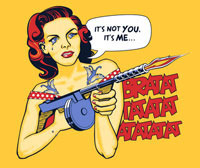
I said goodbye to half my readers, but I didn’t mean to.
We’ve all signed up for newsletters and lost interest. Perhaps we wanted the free book or the course discount, or we were certain we were going to become mad keen quilters but life didn’t work out that way. Or maybe the guy writing the newsletter lost what you thought he had.
If you’re like many people, you don’t unsubscribe at that point: you just delete the emails from your inbox unopened. That’s:
a chore for you, and
bad for the guy running the mailing list
Some maths. (Stay with me.)
Some simple maths follows. The gist is that people who’ve completely lost interest in your newsletter make it harder to see how you’re doing.
When things are going well 80% or more of my subscribers open my emails. That’s called the open rate.
The open rate is important because it gives you a sense of how you’re doing. If fewer people open your emails, maybe you need to work on your relevance, your writing, or making your headlines enticing.
After a while, however, my true open rate will be distorted by subscribers who have no interest in reading anything I write, however relevant, well-written, or enticingly titled. That’s true of any list.
Percentages matter, even when the actual numbers are the same
Let’s say I have 1,000 subscribers. Now let’s say 300 people, a third of the list, have permanently lost interest for whatever reason.
If 80% of the 700 remaining subscribers open an email, that’s 560 readers.
But my open rate won’t be 80%, my open rate will be just 56%. That’s because I still have 1,000 people on my list, even thought 300 are unlikely ever to open an email from me again.
80% of 700 subscribers and 56% of 1,000 subscribers both add up to 560 readers, but you’ve got a better chance of measuring how you’re doing if you’re looking at subscribers who are at least potentially still interested.
So you contact the uninterested
Every so often I email people who haven’t opened an email from me in three months to ask them if they’d like to stay subscribed. If they haven’t clicked the “yes” link within a couple of days, I remove them from the list. Normally that’s almost all of them.
This is just good list management, so it’s common practice. It’s better for the list owner and, frankly, I don’t like the idea of sending out emails to people who are thinking, “Why is this guy spamming me?”
My mistake this time
This mailing list trim was the task I set myself last week, except I screwed up. Instead of asking only the people who hadn’t opened an email in three months, I sent the question to everyone, even people who had only signed up that day. Doh!
The response
The first email I received was swift and harsh:
That last email just makes you sound a lot like a big bully that’s also so full of himself.
The author told me she’d saved me the trouble of removing her from the list by clicking the unsubscribe link on the email, herself. She wasn’t alone, about 20 others did the same.
I also had some emails from:
people saying they’d hate to be unsubscribed, and
less kind emails from people who were annoyed: why would I be making them jump through this hoop when they generally read my emails?
I was grateful to both groups because feedback is always valuable. And they gave me a chance to explain the mistake. Who knows how many readers I lost who couldn’t understand why I was asking such a redundant question?
The result
Now I had a decision to make. I’d told everyone on the list that they would be unsubscribed if they didn’t click a link. What about those who might have been on holiday? Or don’t open every email but still want to be on the list? Should I honour my promise?
I made the choice to split subscribers into three groups:
Those in the actual target group: people who’d not opened an email in three months. I unsubscribed everyone in this group if they didn’t ask otherwise.
Everyone who opened the email and didn’t click the link to stay subscribed. I figured these people were saying they would like to be unsubscribed, so I did take them off the list.
People who had opened emails in the last three months but didn’t open this one. These people I left on the list. (There’s always an unsubscribe link on emails, so they can do it any time.)
Between the first two groups I lost half my list. I choose to see the positive. I’d expected to lose a third because that’s about how many hadn’t opened an email for months. The others I didn’t mean to lose but they wanted to go, so perhaps not a genuine loss: they would have gone the next time round.
For those of you who remained
Thanks for sticking with me!
Tempted to join now???
If you haven’t joined the mailing list now, at least you know now I’m unlikely to make that mistake again! You can sign up here. (And that still gets you my How to Publish Your Ebook on Amazon’s Kindle course for $10, a 91% saving on the public price of $110.)
Rate this post at: How I lost half my readers in 48 hours
Read and comment on more great content on the Taleist self-publishing blog

March 20, 2013
Novel ideas for travel and tourism

I read Brideshead Revisited to whet my appetite before going to the university where much of it is set. (There were fewer teddy bears than I was expecting.)
I recently read The Bat, Jo Nesbo’s first Harry Hole detective story. It’s set in Sydney, where I’ve lived for the last decade. Nonetheless, as well as enjoying the story and the writing, I learned plenty about my home from Nesbo’s research. If I didn’t already live here, it would have made me want to visit Sydney — even if people were being murdered.
More recently, I read Crossing to Safety. Like lots of new readers, I’d bought it because it was recommended in The End of Your Life Book Club. That novel made me want to visit New England.
I’m in Thailand at the moment. I used to come here a lot because my dad lives here and I lived in Hong Kong, a short flight away. When I wasn’t here I enjoyed Jake Needham‘s crime books set in Bangkok, especially The Big Mango, they reminded me how much I wanted to go back.
Longtime readers will know that I think destination marketing organisations promoting tourism are missing a trick by not using Amazon’s self-publishing system to create their own niche guides. I wrote a white paper about it called The Corporate Self-Publisher.
Locations pay — or make it financially attractive — for TV shows and movies to shoot there because they know it will make people come. People schlep all the way to Notting Hill just to see a door that Hugh Grant and Julia Roberts walk through in the film. But what about the poor, forgotten novelists whose writing inspires us to travel to places far and wide that we might not otherwise visit?
Which novels have inspired you to travel — or dream of it — so they should have a big thank you from a tourist board stamped on the front?
In Melbourne? I’ll be giving three training sessions between 5 and 7 April. For details, click here.
Have you signed up for my new online course How to Publish Your Ebook for Amazon’s Kindle? Over 200 people have. Details are here.
Rate this post at: Novel ideas for travel and tourism
Read and comment on more great content on the Taleist self-publishing blog

February 14, 2013
Netflix says it’s a great time to be a writer
Scroll to the bottom for an 85% discount on my new online course!
Netflix released all 13 episodes of the thriller House of Cards (a remake of the British mini-series of the same name, with Ian Richardson). And it’s all part of a couple of trends with a clear benefit to writers.
[image error]
Kevin Spacey in Netflix’s “House of Cards”
The decision to make the entire season available in one go — rather than release one episode a week — has made the news.
For writers, however, the more interesting angle is that everybody wants to be in the content business.
Netflix built its business posting, then streaming, other people’s video content to subscribers. Now it’s making its own shows, including a new season of Arrested Development .
AMC entered the business of producing original shows four or five years ago, most notably bringing us Mad Men .
Hulu, which also started as a distributor of other company’s content, has its own shows, including Spoilers With Kevin Smith. In fact, the company has put $500 million into making its own content.
It’s not hard to see the pattern
In the printed word department, Amazon, as we all know, has been not just in the book-selling game but in the traditional publishing business for years. As well as “normal” books, Amazon is also in the content game commissioning Kindle Singles and Kindle Serials, or at least manning the gates of those sections of its bookstore.
Amazon’s not limiting itself to producing written content, either. Amazon has commissioned TV pilots, including Alpha House, starring John Goodman and written by Gary Trudeau of Doonesbury.
Audiences are smaller but…
 All this fragmentation means that audiences for each outlet are smaller, but that’s only something to lament if you used to be NBC or one of the other tiny number of players, each controlling a huge share of the audience.
All this fragmentation means that audiences for each outlet are smaller, but that’s only something to lament if you used to be NBC or one of the other tiny number of players, each controlling a huge share of the audience.
For you and me, more audiences means more demand for people who can produce content.
Trend #1: Companies are recognising that people value original content highly.
No, I’m not saying you’d have to start writing TV shows…
At the same time audiences have been fragmenting, people have been waking up to the value of their time. Unlike money, your time is something you can’t make any more of, which makes it valuable.
The more valuable you consider your time to be, the less tolerant you are going to be for marketing guff and superficial advertising.
Companies that want our attention are going to have to give us something valuable for it. Something like great content.
Last year my wife and I stayed at the Spadari al Duomo hotel in Milan. The hotel had left on our pillow a slim volume of two short stories. The hotel is part of the Hotels Association of the Golden Book, which believes books add a touch of class to the tourist experience. Which of course they do but, more importantly, someone had to write those stories.
Trend #2: Even companies that aren’t naturally in the media business are starting to realise they, too, can provide valuable original content.
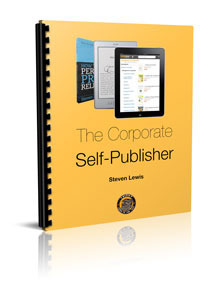
The tools we use to self-publish our work are just as available to businesses. Writing and self-publishing is a service you’re qualified to offer.
I’ve argued for a long time that companies need to start self-publishing (see my white paper The Corporate Self-Publisher , for instance). If I were running a tourism destination, for example, it would be a no brainer for me to have my own travel guide on Amazon.
If I had a bakery, I’d definitely have a blog full of interesting information about my products, my production, how to bake, and so on.
But who says tourism operators and bakers can write?
The business world is waking up to the fact that people swap their attention for what’s interesting and useful to them.
Creating that content takes creative people. People like writers.
Sure, your dream might be to have your own novel, but there’s no shame in earning a living writing interesting things while you wait for your big break.
It’s an exciting time to be a writer.
More good news…
My new course Publish your ebook on Amazon has launched and you can enjoy an 85% discount for the next 24 hours only with the coupon code BKSP165.
The course includes 4.5 hours of instruction simplifying publishing your ebook on Amazon, taking away any uncertainty, and showing you how to succeed in the business of self-publishing with Amazon.
Rate this post at: Netflix says it’s a great time to be a writer
Read and comment on more great content on the Taleist self-publishing blog

January 16, 2013
Twitter, prophecy, and the 1998 Nokia Communicator
The next 50 people SAVE $65, a 70% discount, by clicking here. But you have only 24 hours to use the links! After that, the course is full price.
Back when I was writing on paper.
Back in 1998 when I was writing a technology column for a Sunday newspaper, I wrote that I couldn’t imagine anyone wanting email on their mobile phone. Why, I wrote, would anyone want to get email on the bus?
I’ve dined out on that story of near-sightedness for years. I use it to illustrate everything from why you shouldn’t believe what you read in the newspapers to, more specifically, why you shouldn’t listen to me.
I wanted to use it today to talk to you about Twitter, so I thought it would be fun to see if, after all these years, I still had the column and I could quote you exactly what I’d said.
Imagine my excitement, therefore, when I found a yellowing A3 clipping from the Sunday postmagazine of the South China Morning Post‘s 3 May 1998 edition.
I was reviewing the Nokia Communicator, which Nokia called a “mobile office”.* I said that was like calling a sandwich bag a mobile fast-food outlet. So far, so right.
Then came the well-remembered paragraph:
“I am addicted to the Internet. Already I eschew** the phone in favour of e-mail, often ignoring it when it rings and replying to voicemail messages in writing. If I could check my e-mail and browse the Web on the bus or in a restaurant I would probably forgo all non-electronic interaction: a good thing for those around me but a setback to my rehabilitiation into society.”
So in fact I didn’t ask why anyone would want the internet on the bus. I recognised that indeed I’d love it and would prefer it to talking to anyone. I was RIGHT! What a PAIN!
A great anecdote lost to the truth, but ready to rise again into one about my foresightedness and self-awareness.
Remember you have only 24 hours to use the special links at the bottom of this post to get the course for free or to save $65
Now we’ve recognised I’m a prophet…
Okay, so it turns out from my faulty recollection of writing about the Nokia Communicator 15 years ago that I am in fact a prophet of the obvious, so gather round and listen up while I tell you something else obvious with complete confidence:
Twitter is here to stay. It’s not a fad, it’s not madness, people won’t get bored with it.
Or, if it’s not Twitter itself, something very like it.
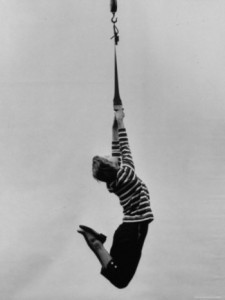
Let go: It’s time to accept it’s here to stay, and learn how to use Twitter
You don’t get hundreds of millions of people saying, “We like communicating this way, we find it useful and rewarding”, then find that way of communicating goes away to be replaced by something unrecognisable.
I can’t say it’ll be Twitter providing a Twitter-like service in five or 10 years, but there will be an equivalent.
If you’ve been hanging on, it’s time to let go
If you’ve been hoping that Twitter will go away before you have to get to grips with it, it’s time to let go.
I’ve been running courses on Twitter for awhile and I know that some of you are feeling left behind.
But the facts of Twitter are simple:
Bad news: Other people do understand Twitter, and they are getting ahead by using it.
Good news: You can catch up in about two hours, if you have the right instruction.
Which brings me to my final point…
More good news
(If you can’t see the video, click here.)
I’ve taken my popular offline course What the hell is Twitter? and turned it into an online course.
You can still ask me questions, just like a live audience, but you also get:
Screen videos showing you exactly what to do
And still the pleasure of listening to me talk, just like you would if you were with me in person
Details and, if you’re in time, a chance to get it for free or at least save $65
The course includes 2.5 hours of video instruction and comes with a 30-day money-back guarantee.
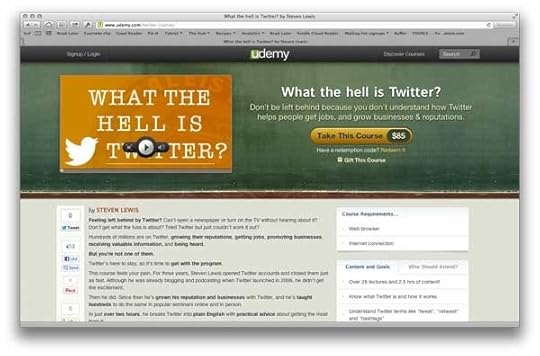
What the hell is Twitter, the course as it appears on Udemy – the Academy of U
FOR 24 HOURS ONLY: My brand new online course What the hell is Twitter? is free to the first 20 people who sign up with this link. [Update: free passes have gone]
The next 50 people SAVE $65, a 70% discount by clicking here. But you have only 24 hours to use the links! After that, the course is full price.
* Among other things, the Nokia Communicator could send faxes
** I’ve always been pompous.
Rate this post at: Twitter, prophecy, and the 1998 Nokia Communicator
Read and comment on more great content on the Taleist self-publishing blog

December 30, 2012
Is Amazon becoming just a little sinister?
Amazon is becoming more transparent about how much it knows about you. Helpful or creepy?

Your Kindle is watching you
Last night I downloaded a sample of Jon Ronson’s Lost at Sea on my new Kindle Paperwhite. I read my free 10 per cent and liked it. When asked at the end of the sample what I’d like to do next, I clicked to buy the book. Then something new happened.
Previously, buying the book would have resulted in the full book downloading and sitting on the Kindle in addition to the sample. It was a small irritation that I had to manually delete the sample. Not anymore. Amazon has taken the logical leap that, if you’ve got 100 per cent of the book, you don’t need an additional copy of the first 10 per cent. Poof! The sample disappeared.
Another minor irritation has always been that the full book would open at the beginning, requiring one to skip forward to the point where the sample had ended, which in a long book could be quite a lot of clicking. Not anymore. The full copy of Lost at Sea opened to the paragraph at which the sample had left off because Amazon knows I’ve already read that much.
I found this helpful but at the same time a little sinister.
It’s as if Amazon is following the plotline of one of those novels where a solicitous and helpful new “friend” learns more and more about a person’s hopes, dreams, fears and needs. Over time the friend uses that knowledge to put the other person into their thrall until eventually they’re unable to do anything for themselves.
I exaggerate perhaps but last night’s experience was a reminder that Amazon is standing over my shoulder when I read, something I wrote about in Are online bookshops giving traditional publishers an unfair advantage?, following the Wall Street Journal‘s report on the data about us that Amazon is amassing and sharing with (traditional) publishers.
Our librarians and booksellers have always known plenty about our reading habits, but we expected them to exercise a priestly discretion about it. And what they knew is nothing compared to what Amazon knows, which it turns out, as the WSJ reports, it has no intention of keeping to itself.
We don’t like it when we read that law enforcement is looking at library records to try to draw conclusions about readers and their motives, and when I’ve written, myself, about the data I have about my blog readers, at least one person found it “creepy”. Nonetheless, we’re handing out even more data to Amazon every time we turn on our Kindles, and Amazon is not afraid to use it and share it; it’s also increasingly bold in showing us that it’s using it. Yes, it’s more convenient; and, yes, it’s quite handy to get targeting book recommendations, but it does feel a little sinister.
What do you think? How much are you willing to give up privacy in return for convenience? Or do you not see this as question of privacy at all?
Rate this post at: Is Amazon becoming just a little sinister?
Read and comment on more great content on the Taleist self-publishing blog

October 31, 2012
Bad review. Good news?
 On our recent trip, my wife pointed out how good the British Airways business life magazine is. This issue included a piece by Steve Martin, co-author of Yes! 50 Secrets from the Science of Persuasion.
On our recent trip, my wife pointed out how good the British Airways business life magazine is. This issue included a piece by Steve Martin, co-author of Yes! 50 Secrets from the Science of Persuasion.
There’s no such thing as bad reviews. For some books.
He was writing about research from the Wharton School of Business that has proved a bad review can increase book sales.
The study tracked sales of books reviewed by the New York Times. As expected, good reviews caused sales to rise and bad reviews caused them to fall.
Except some books had a 45 per cent increase in sales after a bad review.
That exception was for books by unknown authors.
Martin writes:
[The report] reasoned that by making potential customers aware of… a product that they would not normally have heard about, even the most negative review will act as a positive one.
Put another way: it’s better for readers to have heard bad things about your writing that to have heard nothing at all because at least some of those who’ve now heard of you will try your book.
So take heart at your next bad review!
Questions and a thank you
Thank you to those of you who rode to my defence with comments and nice emails after I was attacked as an “asshat” for using a YouTube video on the sales page for my How to write a mummy blog course.
Q: Amazon taking down reviews?
I had an email from a reader saying she’s lost about 20 legitimate reviews — taken down by Amazon. I’ve been out of it for a while. Is this well known? I wasn’t able to shed any light on it. Can you?
Q: Amazon changing Before You Go…?
Reading traditionally published books while I was away, I noticed my Before You Go… screen was showing up before the end of the book, not as before with the last page turn after all the end matter. Anyone else seen the same? Is Amazon getting smarter about knowing the difference between the end of the final chapter and the end of the whole book? Or is there a new formatting tag I don’t know about that tells the Kindle when to show the BYK screen?
Rate this post at: Bad review. Good news?
Read and comment on more great content on the Taleist self-publishing blog

October 25, 2012
What not being a mummy blogger has taught me
Back from a lovely month’s holiday and straight into some social media controversy generated unwittingly (isn’t it always?) by, um, me.
I run a social media course called How Write a Mummy Blog. When I was writing the page about the course I found a funny video made by some female Australian bloggers. It’s called Shit Oz Bloggers Say – Episode 1.
I embedded it in the page, although they don’t call themselves “mummy bloggers” and I understand why. It was just:
witty
showed blogging and bloggers in a cool light (not the dull loners people who haven’t blogged sometimes say we are)
demonstrated specifically that the sites of mothers-who-happen-to-blog don’t have to be twee, if they don’t want them to be
The page has been up for a while but today I got an email from someone, which was titled “It’s not nice to steal content“.
In its entirety it said:
Just one of many comments made once your blatent stolen video was posted by one of the women in the video.
Do you think ‘mummy blogger’ was his keyword? He used the phrase about a million times. It is very opportunistic of him to jump on the bandwagon like that and use your video without permission. I don’t know if he’s a blogger but he’s definitely not a mummy, so he’s not qualified. Plus, that photo of him on assignment in Thailand is really dicky.
I should have picked this up from Twitter already (I’ve been getting a pasting there, it turned out) but I’ve been off colour since getting back at the weekend, plus trying to catch up on other things, such as (ironically) parenting.
Stealing?
Did I steal the content? No. YouTube generates code anyone can use to embed a video in their website, but it also gives the owner of the video the opportunity to switch that feature off.
By enabling embedding, you’re allowing people to share your video by including it in their website. That’s part of the magic of YouTube and how videos get seen by bigger audiences than if the videos were only on YouTube.
The feature also embeds attribution and linking, so wherever you watch the video you can see exactly who created it and go back to the original.
It’s unkind (and wrong), therefore, to say that I stole it.
I’m particularly sensitive about this because I found someone today who is essentially serialising the Taleist Self-Publishing Survey on his blog, including even the artwork. I don’t like this, so I certainly wouldn’t do it to someone else.
I don’t even like the idea that I’m perceived as stealing, so I’m more than happy to take the video down, but it’s there now so you can see the original mummy blogging course page for yourself and make up your own mind. [Update: It's gone now.]
Using someone else’s image to promote my course?
Considering he’s using my image to promote it, should I enrol in Steven’s “How to Write a Mummyblog” course? centre.taleist.com.au/event/how-writ…
— edenland (@edenland) October 25, 2012
I hadn’t thought about it that way at all. I really just thought it was cool video. I didn’t think for a second anyone would think I was suggesting these successful bloggers were endorsing my course.
But I see that’s an argument and I’m more than happy to take the video down on that basis if they would like me to. (Or any other basis — it’s their video.)
Can a father teach a “mummy blogging” course?
@amelia_draws @edenland @woogsworld @rule17 personally I am staggered that some bloke thinks he can tell us about mothers, that’s just me.
— Nareen Young (@nareenyoung) October 26, 2012
The course is about the terminology, techniques, and technology of blogging, not about how to be a mother. There’s no suggestion that I’m presuming to teach anyone anything about motherhood.
When I teach a blogging for business course, I’m not teaching them about business, any more than I’d be presuming to tell Pfizer anything about medicine, if I were running a blogging for pharmaceutical companies course (which I’ve done).
I don’t think I can teach mothers about motherhood. That’s not what the course is about, it’s not what it says it’s about, and it would be ridiculous if it were about that.
An apology and a lesson learned
I certainly didn’t mean to misuse or even be perceived as misusing someone else’s work, let alone stealing it. I used it for the reasons I’ve given above and, if its owners would rather I didn’t, I’ll take it down. I’ll still recommend you watch it, because it’s witty.
I do take on board the point that I could perhaps have been seen as using their images to suggest they endorsed the course, although I hope most, if not all, who’ve read the page could see that I was just tipping my hat at a great video.
Nonetheless, I should have been more sensitive to that and asked specifically whether they would see this as in that spirit, rather than doing what I did and relying simply on the embed code being available.
As a result of that, my apologies to:
Styling You
Baby Mac
Woogsworld
Edenland
Bigwords
Where’s My Glow
Rate this post at: What not being a mummy blogger has taught me
Read and comment on more great content on the Taleist self-publishing blog


